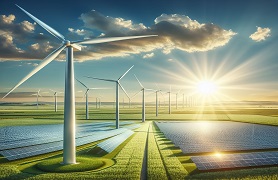Practice Areas
Industries
Attorneys
Understanding What Matters in Wind or Solar Leases
 When leasing land for wind or solar energy projects, there are several important factors to keep in mind. A well-crafted lease agreement outlines parties’ responsibilities and benefits. Some factors to consider are outlined below.
When leasing land for wind or solar energy projects, there are several important factors to keep in mind. A well-crafted lease agreement outlines parties’ responsibilities and benefits. Some factors to consider are outlined below.
Visual and Noise Concerns
Screening and Visibility: First, think about what will be seen every day. This includes how far back the equipment is set, what the perimeter fence looks like and where the solar panels or wind turbines are located. Also, consider the placement of any substations, including whether they will be lit at night.
Noise: Noisy equipment should be considered and factors to mitigate any such sound should be implemented. For wind turbines, noise levels should not exceed certain limits.
Environmental Impact
Weeds: For farmland, determine how the developer will handle weed control. Regular maintenance is necessary to prevent the spread of weeds and maintain proper appearance of the land.
Water: Consider how the project may affect water drainage on the land, including the impact to farm tiles. The lessee should repair or compensate the owner for any damage to drainage tiles. Also determine if the project will affect underground water sources that supply wells or water aquifers.
Old Oil/Gas Wells or Mineral Reservations: Understand how the project might impact any old oil or gas wells on the property or mineral reservations. Oil and gas well are regulated. So, the developer should have plans to monitor and possibly cap them if needed. In terms of mineral reservations, the property owner must be sure that the holder of mineral rights is not precluded or prevented from exercising such rights.
Wildlife: Consider how the project will affect local wildlife. Ensure any fencing allows animals to pass through. This consideration is an important consideration in terms of the impact on hunting. For example, will the fencing influence wildlife movement?
Crop and Timber Damage: The lease should include compensation for any damage caused by the developer's activities to farmland, crops or timber on the property.
Property Value
Impact on Property Values: Understand how the project might impact property values.
Maintenance Responsibilities: Agreements may require the developer to use existing roads as much as possible to minimize disturbances as well as indicate responsibility for maintaining and repairing any new roads built. They may also address aesthetic issues including appearance of aging equipment, painting fences, etc.
Easements and Access: The lease should clearly outline the terms, including how the developer will access the land, the right to enter the property for activities like soil sampling, environmental assessments and the installation of necessary equipment.
Construction and Operation
Construction Terms: Construction timeline and what happens if the project is delayed should be covered in the agreement.
Decommissioning: A plan for removing the equipment and restoring the land once the project is over typically is found in agreements. This includes fixing any damage to underground pipes and ensuring the land is back to its original state.
Payments and Rent
Rent and Payments: The lease should clearly state the rent and any additional payments, including annual payments and one-time installation fees.
Taxes and Assessments: Clarify who will be responsible for paying taxes and assessments on the property.
Most Favored Nations Clause: This clause ensures that if the developer pays higher rent to another landowner in the same project, they must offer the same higher rent to other property owners.
Legal and Insurance
Insurance: The developer should carry insurance to protect against any damage or injuries that occur due to their activities on your property.
Permits and Laws: The developer must comply with all local, state and federal laws as well as obtain the necessary permits.
Liens: The lease should ensure that the property remains free of any liens caused by the developer's activities.
Additional Considerations
Confidentiality: Some leases include a confidentiality clause to keep the details of the agreement private, especially financial terms.
Hazardous Materials: The lease should include provisions for handling any hazardous materials used or generated by the project.
Condemnation and Force Majeure: If the property is taken by eminent domain or if an unforeseen event (like a natural disaster) impacts the project, the lease should have provisions to respond to these circumstances.
In summary, a wind or solar lease involves many detailed considerations. It is important to understand these factors to ensure all parties in the agreement experience a successful and mutually beneficial project. For questions on solar or wind agreements, please contact Mr. Tucker or Mr. Sadowski.
___________________
Disclaimers:
The article in this publication has been prepared by Eastman & Smith Ltd. for informational purposes only and should not be considered legal advice. This information is not intended to create, and receipt of it does not constitute, an attorney/client relationship.
